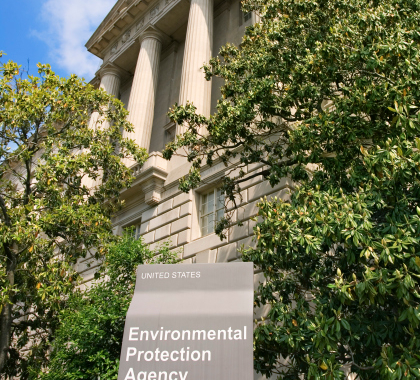Editor’s Note: Myron Ebell is director of energy and global warming policy at the Competitive Enterprise Institute (CEI). He chairs the Cooler Heads Coalition, which represents more than two dozen nonprofit groups in the United States and abroad that question global warming alarmism and oppose energy-rationing policies. Most recently, Ebell headed President Donald Trump’s Environmental Protection Agency (EPA) transition team. This interview was conducted after Ebell won the 2017 Speaks Truth to Power Award at The Heartland Institute’s 12th International Conference on Climate Change (ICCC-12).
Burnett: There are degrees of skepticism regarding the theory humans are responsible for climate change and whether its effects on human well-being and ecosystem health will be negative. Some don’t believe humans are playing any role in current climate conditions, others think we have had a modest impact, and still others think humans are affecting climate but it’s not likely to have a dangerous impact, with some in this group saying they believe it could even be beneficial. Where do you fall on the spectrum?
Ebell: I try to follow the best science available, but, unfortunately, a lot of the science promoted by the global warming alarmists and the mainstream media is junk science. The work that The Heartland Institute and Nongovernmental International Panel on Climate Change do to sort out the real science from all the junk is absolutely critical to the debate.
To summarize my view, atmospheric concentrations of greenhouse gases are going up, primarily from carbon-dioxide emissions from burning coal, oil, and natural gas. All other things being equal, this should cause some increase in the global mean temperature. The data suggest that the rate of warming is modest. But the debate is dominated by climate modelers, whose models predict much faster rates of warming than what has actually occurred. Anyone who relies on the models instead of the data should consider this statement: “The climate system is a coupled non-linear chaotic system, and therefore the long-term prediction of future climate states is not possible.” That’s from the executive summary from Working Group 1 of the Intergovernmental Panel on Climate Change’s “Third Assessment Report.”
The alarmist case exaggerates the rate of warming based on model projections; exaggerates or, in many cases, makes up the negative impacts of warming; completely ignores the positive impacts and the direct beneficial impacts of higher carbon-dioxide concentrations; and substantially underestimates the cost of reducing emissions.
Burnett: At ICCC-12, you said the election of Trump means the time is ripe to reset climate policy. Why is that so, and what policy changes do you recommend?
Ebell: I think now is the time because President Trump campaigned on turning the country around and getting us back to 3-percent-per-year economic growth, and he focused on undoing EPA’s regulatory rampage as a key to achieving 3 percent growth. In some of his comments during the campaign, Trump recognized the push behind global warming alarmism comes from a lot of big companies and investors who plan to get rich off the backs of consumers and taxpayers. This climate-industrial complex has become very powerful and is going to push back very hard.
The danger is the Trump administration will be sucked into the swamp before they achieve the president’s major goals. If that happens, they will be back to doing what the George W. Bush administration did for eight years: ignore the global warming issue and hope it goes away. So, CEI and Heartland and all our allies have a lot of work to do to make sure the golden opportunity given to us by Trump’s election and Republican control of Congress is not frittered away.
As for what I recommend, let’s begin with President Trump’s campaign promises: withdraw from the Paris Climate Treaty; defund all U.N. climate programs; withdraw EPA’s rules for limiting greenhouse-gas emissions from new and existing power plants; undo President Barack Obama’s Climate Action Plan, which puts climate programs and offices in every federal government department; reopen the endangerment finding; scrap the stream protection rule and the methane rules; stop using the social cost of carbon in rulemaking; and radically downsize or even abolish EPA.
The Trump administration and the Congress have made a good start on most of these policy changes. We’ll have to see how far Congress will go along with [Office of Management and Budget] Director Mick Mulvaney’s request for a 31 percent cut in EPA’s budget. Beyond these policies, there is more to be done. For example, [Congress and the White House should] get rid of or reduce various energy subsidies and mandates that enrich the climate-industrial complex. I would add one other big task: to reform EPA’s misuse of science in rulemaking. It won’t be easy, but I think it’s absolutely essential.
Burnett: In your presentation at ICCC-12, you said even if Trump cuts EPA’s budget substantially and withdraws the Clean Power Plan, he has to go further and rescind EPA’s carbon-dioxide endangerment finding. Why must EPA withdraw the finding?
Ebell: Opinions vary on what to do about EPA’s 2009 finding that greenhouse-gas emissions endanger public health and welfare and therefore must be regulated under the Clean Air Act. My view is we will never be rid of the climate regulations until the endangerment finding is reversed. I think the original finding can be overturned by using the federal Information Quality Act to throw out the junk science from the IPCC and the National Climate Assessments EPA relied upon, as well as by reviewing more recent science that undermines the case for endangerment.






